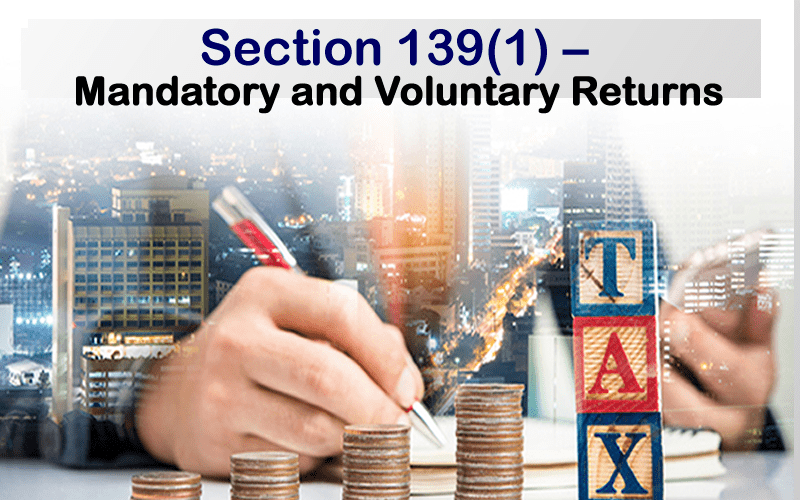![]()
Section 139(1) – Mandatory and Voluntary Returns
Under Section 139(1), in the following cases the filing of Income Tax Return is
Mandatory:
Every person who has a total income that exceeds the exemption limit is liable
to furnish Income Tax Return within the due date
Any private, public, domestic or foreign country located and/or doing business
in India
Any firm including LLP (Limited Liability Partnership) or Unlimited Liability
Partnership
Any resident who has an asset located outside of India (might include
financial interest in some entity as well) OR any resident who retains signing
authority for an account based outside India – for all these cases Tax return
needs to be filed mandatorily in the prescribed form irrespective of the amount
of tax liability on those incomes
Every HUF (Hindu Undivided Family), AOP (Association of Persons) and BOI
(Body of Individuals) – if the total income of these bodies or entities exceeds
the prescribed exception limit, they are liable to file the Income Tax Return in
the prescribed format with required documentation
In the following cases, the filing of Income Tax Return is Voluntary :
In certain situations individuals or entities are not under compulsory
requirement to file the return. In such cases their tax filings are considered as
Voluntary returns, which are seen as valid tax returns.
Under Section 139(1c), certain people are exempt from filing income tax. If
these classes of people fulfil the prescribed conditions, the central
government is empowered to grant them tax exemption.
Section 139(3) – Filing Income Tax in case of Loss
In case of an Individual Tax payer, if any loss was incurred in the previous financial
year then filing a tax return is not mandatory
Tax return for loss is compulsory for companies and firms and the provisions are as
follows:
If the loss arises under the head “Profits and Gains of Business and
Profession” or under the head ‘Capital Gains’. Tax return filing is mandatory in
case the firm wants to carry forward this loss and offset with the future
income. Availability of this option is only possible if the tax return indicating
the loss is filed within the due date.
In case the loss arises under the head “House or residential Property”, the
loss could be carried forward even though the tax return is filed after the due
date.
If the loss is filed for return under Section 142(1), except for the loss under
“House property”, other losses could not be carried forward. However, the
unabsorbed depreciation could be carried forward for such cases.
In case the loss is to be offset against some income in other category for the
same year, it is permitted to offset even though return is filed after the due
date.
Loss of the earlier years could be carried forward if the return of losses for
those years were filed with due dates and those losses were assessed.
The advantage of filing the loss returns is that it allows one to carry the loss forward
which reduces the tax liability for the future years. Hence, it is highly advisable to file
the return for loss.
Due Dates for Section 139
Section 139 of the Income Tax Act 1961 consists of different sub-sections that deal
with various kinds of returns filed by different individuals, entities and institutions as
well as different kind of scenarios related to late payments and mistakes. Therefore,
a few due dates are prescribed for this section for individuals or entities by which
dates their income tax returns are required to file. These dates are as follows:
July 31st
For all persons who do not require an audit to be performed for their books of
account, are needed to file income tax returns by July 31, of every assessment year.
This includes the following individuals and entities:
A person or employee who is paid salary
A person who is self-employed or professional
A freelancer or a consultant
September 30th
All persons and entities who are required to or are liable to undergo an audit of their
accounting books, need to file their income tax returns by 30th September of every
assessment year. The following entities and individuals might come under this
category:
A Business entity
Self-employed person or professional
A working partner employed with a firm or a consultant who requires to
have an audit performed on his accounting book

